Case Study Analysis: Business and Corporate Law, LAW6000
VerifiedAdded on 2022/12/20
|9
|2298
|68
Case Study
AI Summary
This document provides a detailed analysis of a business law case study assignment, addressing several key legal issues. The assignment explores scenarios involving contract law, including the enforceability of a 'Heads of Agreement' and the obligations arising from it. It also examines corporate law, particularly focusing on director liability, the application of the business judgment rule, and the implications of financial misconduct. Furthermore, the assignment delves into agency law, analyzing the duties of agents and principals, contract enforcement, and the consequences of breaching agency duties. The analysis includes relevant case law and legal principles to provide comprehensive solutions to the presented legal problems, offering practical advice to the clients involved in each case. The document provides a clear and concise summary of the legal arguments and conclusions, supporting the student in understanding the complexities of business and corporate law.
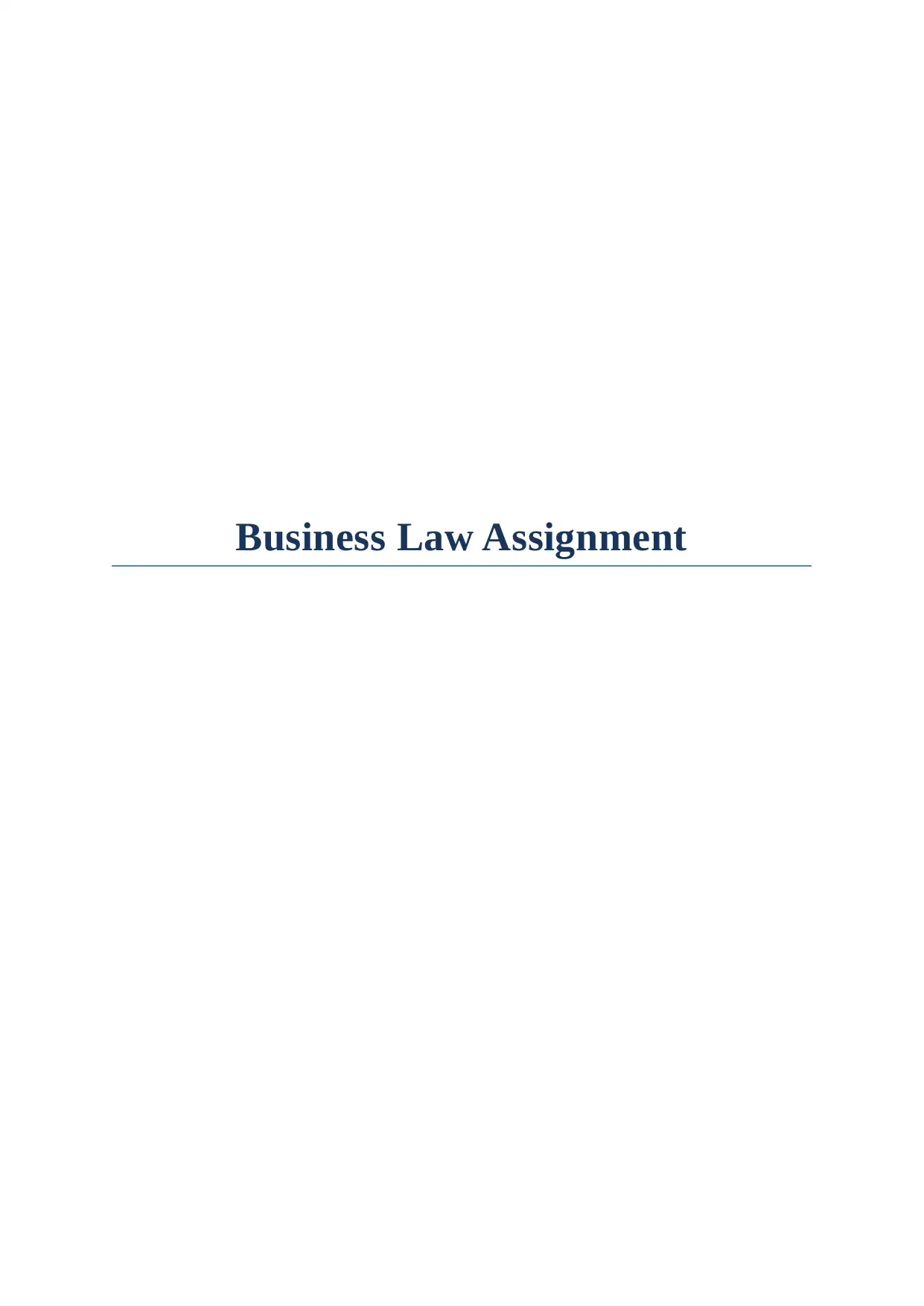
Business Law Assignment
Paraphrase This Document
Need a fresh take? Get an instant paraphrase of this document with our AI Paraphraser
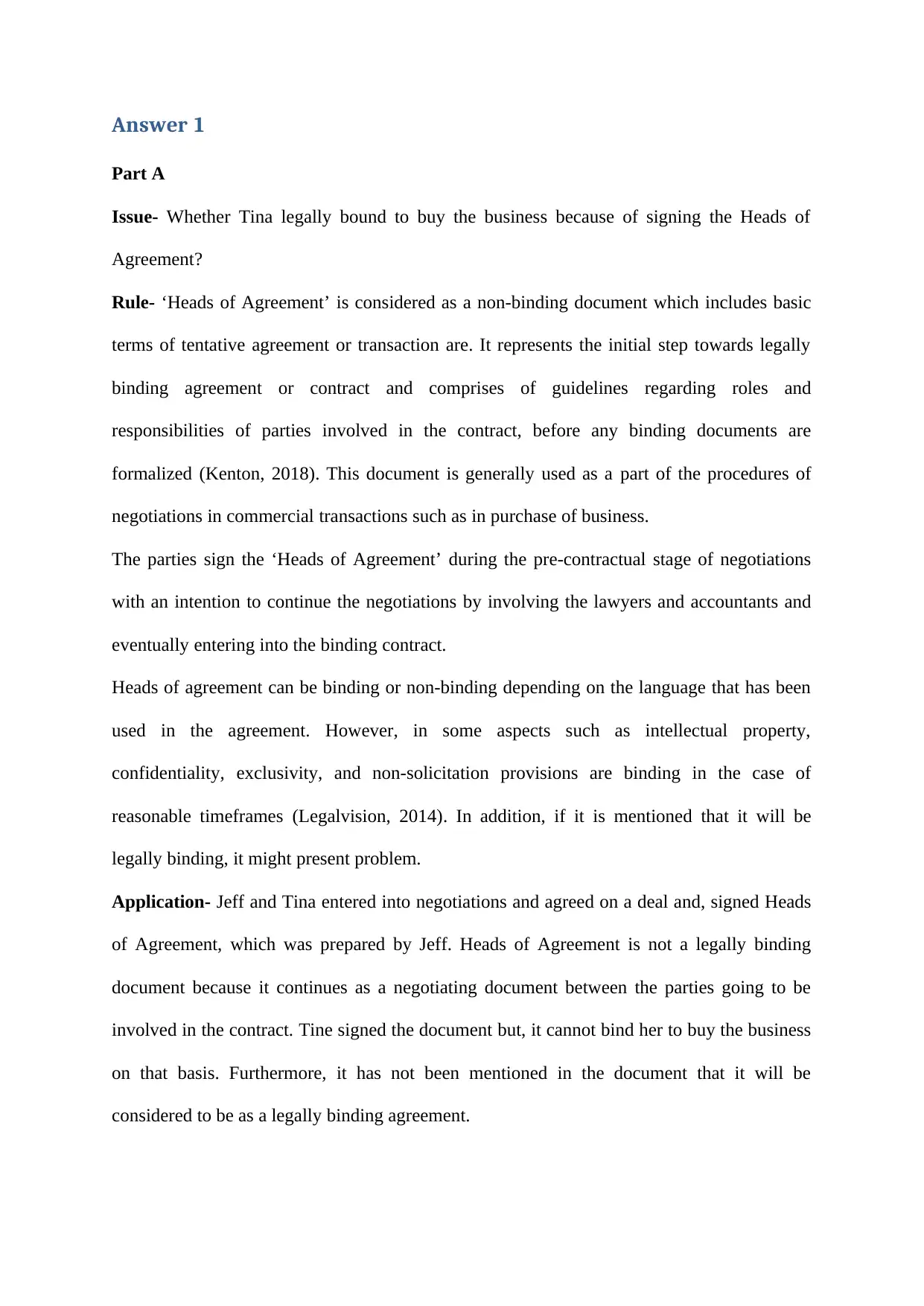
Answer 1
Part A
Issue- Whether Tina legally bound to buy the business because of signing the Heads of
Agreement?
Rule- ‘Heads of Agreement’ is considered as a non-binding document which includes basic
terms of tentative agreement or transaction are. It represents the initial step towards legally
binding agreement or contract and comprises of guidelines regarding roles and
responsibilities of parties involved in the contract, before any binding documents are
formalized (Kenton, 2018). This document is generally used as a part of the procedures of
negotiations in commercial transactions such as in purchase of business.
The parties sign the ‘Heads of Agreement’ during the pre-contractual stage of negotiations
with an intention to continue the negotiations by involving the lawyers and accountants and
eventually entering into the binding contract.
Heads of agreement can be binding or non-binding depending on the language that has been
used in the agreement. However, in some aspects such as intellectual property,
confidentiality, exclusivity, and non-solicitation provisions are binding in the case of
reasonable timeframes (Legalvision, 2014). In addition, if it is mentioned that it will be
legally binding, it might present problem.
Application- Jeff and Tina entered into negotiations and agreed on a deal and, signed Heads
of Agreement, which was prepared by Jeff. Heads of Agreement is not a legally binding
document because it continues as a negotiating document between the parties going to be
involved in the contract. Tine signed the document but, it cannot bind her to buy the business
on that basis. Furthermore, it has not been mentioned in the document that it will be
considered to be as a legally binding agreement.
Part A
Issue- Whether Tina legally bound to buy the business because of signing the Heads of
Agreement?
Rule- ‘Heads of Agreement’ is considered as a non-binding document which includes basic
terms of tentative agreement or transaction are. It represents the initial step towards legally
binding agreement or contract and comprises of guidelines regarding roles and
responsibilities of parties involved in the contract, before any binding documents are
formalized (Kenton, 2018). This document is generally used as a part of the procedures of
negotiations in commercial transactions such as in purchase of business.
The parties sign the ‘Heads of Agreement’ during the pre-contractual stage of negotiations
with an intention to continue the negotiations by involving the lawyers and accountants and
eventually entering into the binding contract.
Heads of agreement can be binding or non-binding depending on the language that has been
used in the agreement. However, in some aspects such as intellectual property,
confidentiality, exclusivity, and non-solicitation provisions are binding in the case of
reasonable timeframes (Legalvision, 2014). In addition, if it is mentioned that it will be
legally binding, it might present problem.
Application- Jeff and Tina entered into negotiations and agreed on a deal and, signed Heads
of Agreement, which was prepared by Jeff. Heads of Agreement is not a legally binding
document because it continues as a negotiating document between the parties going to be
involved in the contract. Tine signed the document but, it cannot bind her to buy the business
on that basis. Furthermore, it has not been mentioned in the document that it will be
considered to be as a legally binding agreement.
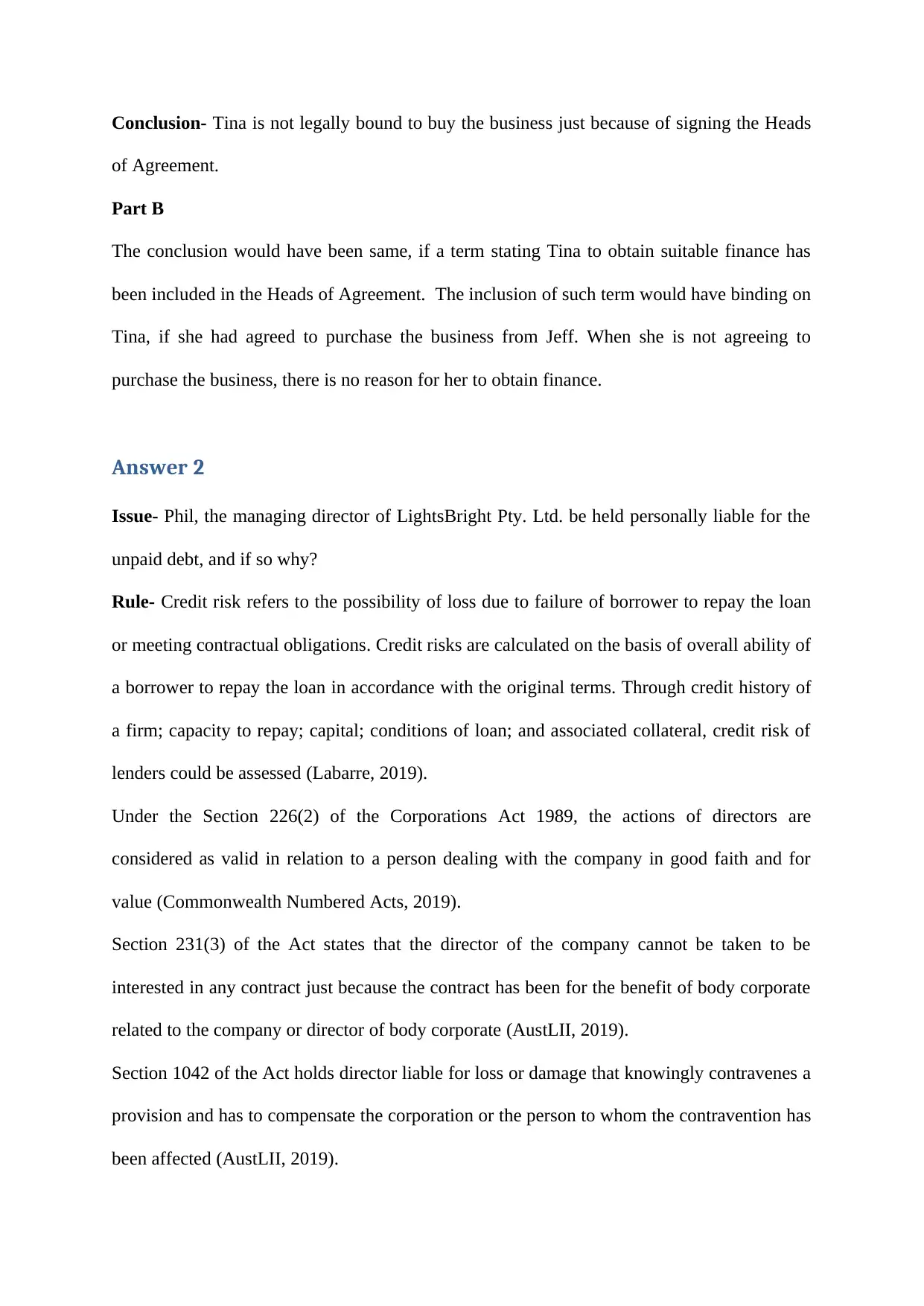
Conclusion- Tina is not legally bound to buy the business just because of signing the Heads
of Agreement.
Part B
The conclusion would have been same, if a term stating Tina to obtain suitable finance has
been included in the Heads of Agreement. The inclusion of such term would have binding on
Tina, if she had agreed to purchase the business from Jeff. When she is not agreeing to
purchase the business, there is no reason for her to obtain finance.
Answer 2
Issue- Phil, the managing director of LightsBright Pty. Ltd. be held personally liable for the
unpaid debt, and if so why?
Rule- Credit risk refers to the possibility of loss due to failure of borrower to repay the loan
or meeting contractual obligations. Credit risks are calculated on the basis of overall ability of
a borrower to repay the loan in accordance with the original terms. Through credit history of
a firm; capacity to repay; capital; conditions of loan; and associated collateral, credit risk of
lenders could be assessed (Labarre, 2019).
Under the Section 226(2) of the Corporations Act 1989, the actions of directors are
considered as valid in relation to a person dealing with the company in good faith and for
value (Commonwealth Numbered Acts, 2019).
Section 231(3) of the Act states that the director of the company cannot be taken to be
interested in any contract just because the contract has been for the benefit of body corporate
related to the company or director of body corporate (AustLII, 2019).
Section 1042 of the Act holds director liable for loss or damage that knowingly contravenes a
provision and has to compensate the corporation or the person to whom the contravention has
been affected (AustLII, 2019).
of Agreement.
Part B
The conclusion would have been same, if a term stating Tina to obtain suitable finance has
been included in the Heads of Agreement. The inclusion of such term would have binding on
Tina, if she had agreed to purchase the business from Jeff. When she is not agreeing to
purchase the business, there is no reason for her to obtain finance.
Answer 2
Issue- Phil, the managing director of LightsBright Pty. Ltd. be held personally liable for the
unpaid debt, and if so why?
Rule- Credit risk refers to the possibility of loss due to failure of borrower to repay the loan
or meeting contractual obligations. Credit risks are calculated on the basis of overall ability of
a borrower to repay the loan in accordance with the original terms. Through credit history of
a firm; capacity to repay; capital; conditions of loan; and associated collateral, credit risk of
lenders could be assessed (Labarre, 2019).
Under the Section 226(2) of the Corporations Act 1989, the actions of directors are
considered as valid in relation to a person dealing with the company in good faith and for
value (Commonwealth Numbered Acts, 2019).
Section 231(3) of the Act states that the director of the company cannot be taken to be
interested in any contract just because the contract has been for the benefit of body corporate
related to the company or director of body corporate (AustLII, 2019).
Section 1042 of the Act holds director liable for loss or damage that knowingly contravenes a
provision and has to compensate the corporation or the person to whom the contravention has
been affected (AustLII, 2019).
⊘ This is a preview!⊘
Do you want full access?
Subscribe today to unlock all pages.

Trusted by 1+ million students worldwide
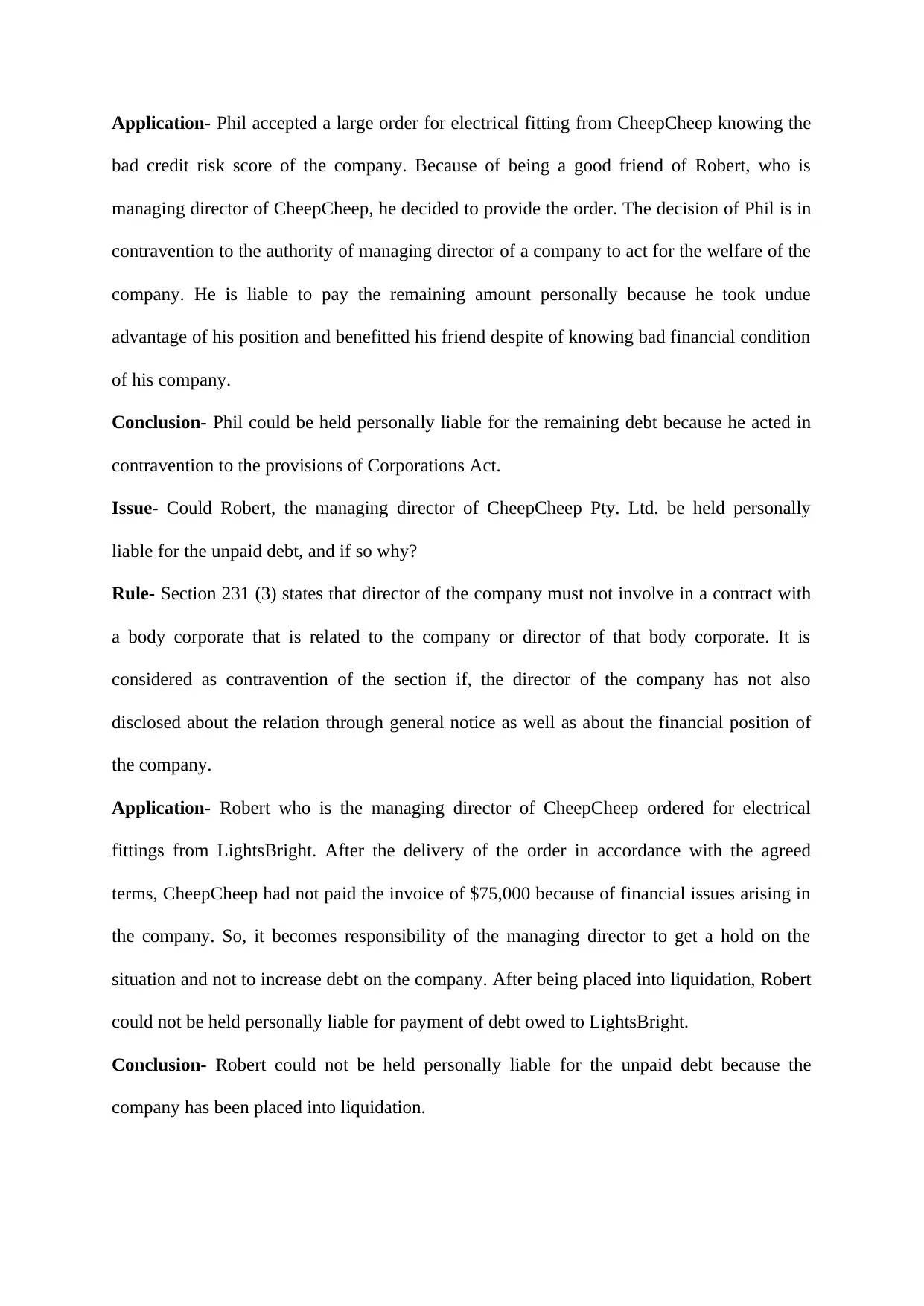
Application- Phil accepted a large order for electrical fitting from CheepCheep knowing the
bad credit risk score of the company. Because of being a good friend of Robert, who is
managing director of CheepCheep, he decided to provide the order. The decision of Phil is in
contravention to the authority of managing director of a company to act for the welfare of the
company. He is liable to pay the remaining amount personally because he took undue
advantage of his position and benefitted his friend despite of knowing bad financial condition
of his company.
Conclusion- Phil could be held personally liable for the remaining debt because he acted in
contravention to the provisions of Corporations Act.
Issue- Could Robert, the managing director of CheepCheep Pty. Ltd. be held personally
liable for the unpaid debt, and if so why?
Rule- Section 231 (3) states that director of the company must not involve in a contract with
a body corporate that is related to the company or director of that body corporate. It is
considered as contravention of the section if, the director of the company has not also
disclosed about the relation through general notice as well as about the financial position of
the company.
Application- Robert who is the managing director of CheepCheep ordered for electrical
fittings from LightsBright. After the delivery of the order in accordance with the agreed
terms, CheepCheep had not paid the invoice of $75,000 because of financial issues arising in
the company. So, it becomes responsibility of the managing director to get a hold on the
situation and not to increase debt on the company. After being placed into liquidation, Robert
could not be held personally liable for payment of debt owed to LightsBright.
Conclusion- Robert could not be held personally liable for the unpaid debt because the
company has been placed into liquidation.
bad credit risk score of the company. Because of being a good friend of Robert, who is
managing director of CheepCheep, he decided to provide the order. The decision of Phil is in
contravention to the authority of managing director of a company to act for the welfare of the
company. He is liable to pay the remaining amount personally because he took undue
advantage of his position and benefitted his friend despite of knowing bad financial condition
of his company.
Conclusion- Phil could be held personally liable for the remaining debt because he acted in
contravention to the provisions of Corporations Act.
Issue- Could Robert, the managing director of CheepCheep Pty. Ltd. be held personally
liable for the unpaid debt, and if so why?
Rule- Section 231 (3) states that director of the company must not involve in a contract with
a body corporate that is related to the company or director of that body corporate. It is
considered as contravention of the section if, the director of the company has not also
disclosed about the relation through general notice as well as about the financial position of
the company.
Application- Robert who is the managing director of CheepCheep ordered for electrical
fittings from LightsBright. After the delivery of the order in accordance with the agreed
terms, CheepCheep had not paid the invoice of $75,000 because of financial issues arising in
the company. So, it becomes responsibility of the managing director to get a hold on the
situation and not to increase debt on the company. After being placed into liquidation, Robert
could not be held personally liable for payment of debt owed to LightsBright.
Conclusion- Robert could not be held personally liable for the unpaid debt because the
company has been placed into liquidation.
Paraphrase This Document
Need a fresh take? Get an instant paraphrase of this document with our AI Paraphraser
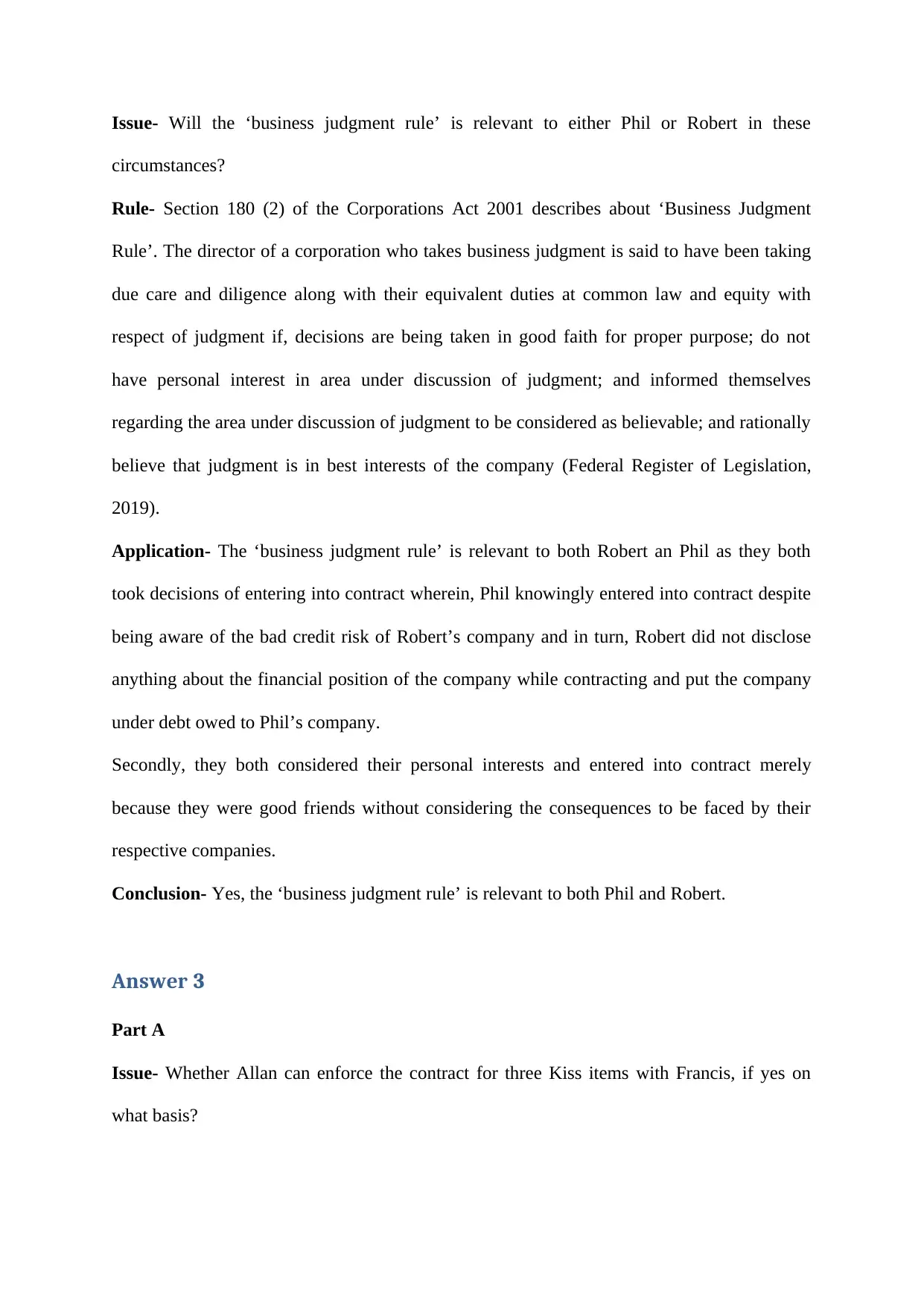
Issue- Will the ‘business judgment rule’ is relevant to either Phil or Robert in these
circumstances?
Rule- Section 180 (2) of the Corporations Act 2001 describes about ‘Business Judgment
Rule’. The director of a corporation who takes business judgment is said to have been taking
due care and diligence along with their equivalent duties at common law and equity with
respect of judgment if, decisions are being taken in good faith for proper purpose; do not
have personal interest in area under discussion of judgment; and informed themselves
regarding the area under discussion of judgment to be considered as believable; and rationally
believe that judgment is in best interests of the company (Federal Register of Legislation,
2019).
Application- The ‘business judgment rule’ is relevant to both Robert an Phil as they both
took decisions of entering into contract wherein, Phil knowingly entered into contract despite
being aware of the bad credit risk of Robert’s company and in turn, Robert did not disclose
anything about the financial position of the company while contracting and put the company
under debt owed to Phil’s company.
Secondly, they both considered their personal interests and entered into contract merely
because they were good friends without considering the consequences to be faced by their
respective companies.
Conclusion- Yes, the ‘business judgment rule’ is relevant to both Phil and Robert.
Answer 3
Part A
Issue- Whether Allan can enforce the contract for three Kiss items with Francis, if yes on
what basis?
circumstances?
Rule- Section 180 (2) of the Corporations Act 2001 describes about ‘Business Judgment
Rule’. The director of a corporation who takes business judgment is said to have been taking
due care and diligence along with their equivalent duties at common law and equity with
respect of judgment if, decisions are being taken in good faith for proper purpose; do not
have personal interest in area under discussion of judgment; and informed themselves
regarding the area under discussion of judgment to be considered as believable; and rationally
believe that judgment is in best interests of the company (Federal Register of Legislation,
2019).
Application- The ‘business judgment rule’ is relevant to both Robert an Phil as they both
took decisions of entering into contract wherein, Phil knowingly entered into contract despite
being aware of the bad credit risk of Robert’s company and in turn, Robert did not disclose
anything about the financial position of the company while contracting and put the company
under debt owed to Phil’s company.
Secondly, they both considered their personal interests and entered into contract merely
because they were good friends without considering the consequences to be faced by their
respective companies.
Conclusion- Yes, the ‘business judgment rule’ is relevant to both Phil and Robert.
Answer 3
Part A
Issue- Whether Allan can enforce the contract for three Kiss items with Francis, if yes on
what basis?
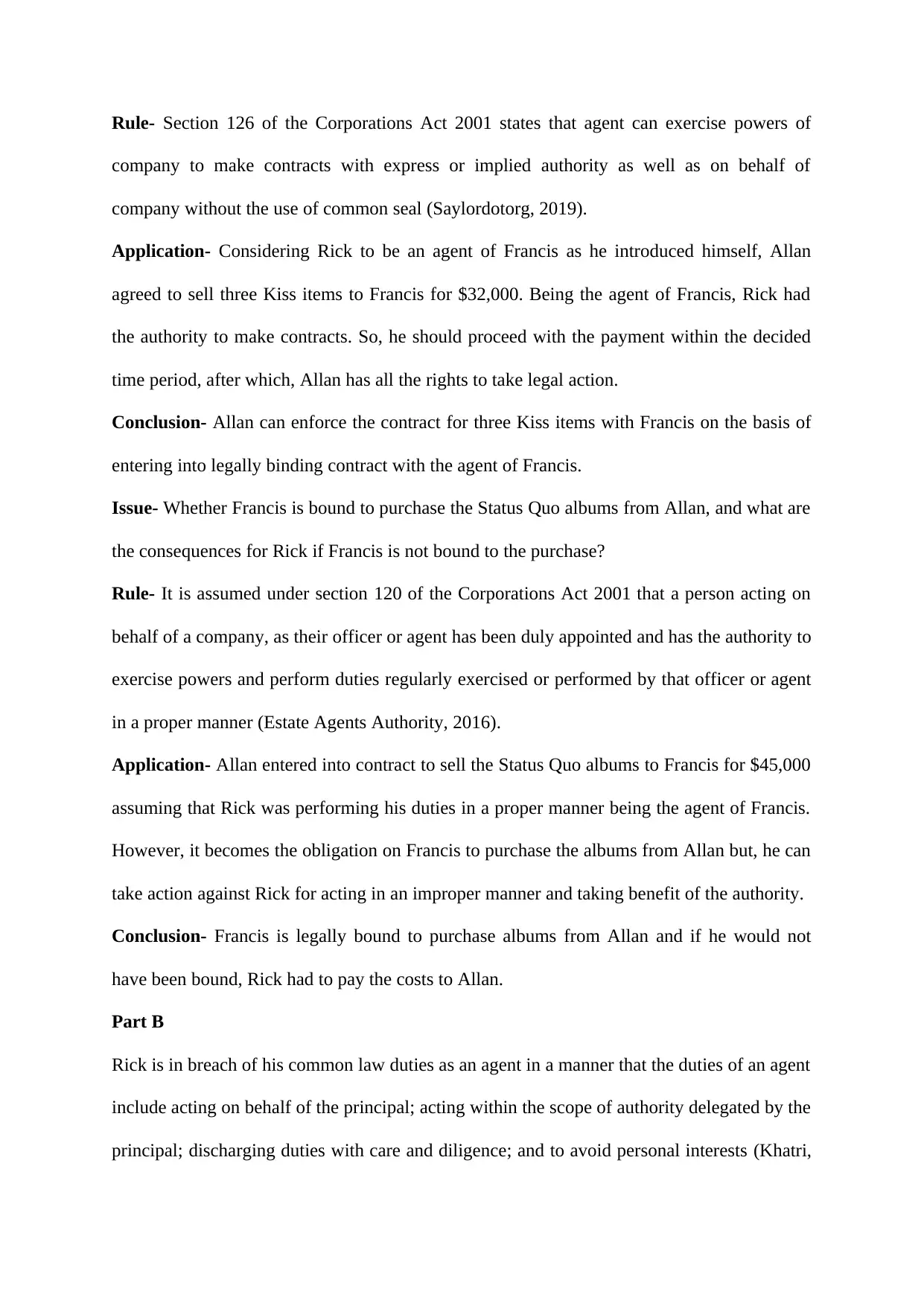
Rule- Section 126 of the Corporations Act 2001 states that agent can exercise powers of
company to make contracts with express or implied authority as well as on behalf of
company without the use of common seal (Saylordotorg, 2019).
Application- Considering Rick to be an agent of Francis as he introduced himself, Allan
agreed to sell three Kiss items to Francis for $32,000. Being the agent of Francis, Rick had
the authority to make contracts. So, he should proceed with the payment within the decided
time period, after which, Allan has all the rights to take legal action.
Conclusion- Allan can enforce the contract for three Kiss items with Francis on the basis of
entering into legally binding contract with the agent of Francis.
Issue- Whether Francis is bound to purchase the Status Quo albums from Allan, and what are
the consequences for Rick if Francis is not bound to the purchase?
Rule- It is assumed under section 120 of the Corporations Act 2001 that a person acting on
behalf of a company, as their officer or agent has been duly appointed and has the authority to
exercise powers and perform duties regularly exercised or performed by that officer or agent
in a proper manner (Estate Agents Authority, 2016).
Application- Allan entered into contract to sell the Status Quo albums to Francis for $45,000
assuming that Rick was performing his duties in a proper manner being the agent of Francis.
However, it becomes the obligation on Francis to purchase the albums from Allan but, he can
take action against Rick for acting in an improper manner and taking benefit of the authority.
Conclusion- Francis is legally bound to purchase albums from Allan and if he would not
have been bound, Rick had to pay the costs to Allan.
Part B
Rick is in breach of his common law duties as an agent in a manner that the duties of an agent
include acting on behalf of the principal; acting within the scope of authority delegated by the
principal; discharging duties with care and diligence; and to avoid personal interests (Khatri,
company to make contracts with express or implied authority as well as on behalf of
company without the use of common seal (Saylordotorg, 2019).
Application- Considering Rick to be an agent of Francis as he introduced himself, Allan
agreed to sell three Kiss items to Francis for $32,000. Being the agent of Francis, Rick had
the authority to make contracts. So, he should proceed with the payment within the decided
time period, after which, Allan has all the rights to take legal action.
Conclusion- Allan can enforce the contract for three Kiss items with Francis on the basis of
entering into legally binding contract with the agent of Francis.
Issue- Whether Francis is bound to purchase the Status Quo albums from Allan, and what are
the consequences for Rick if Francis is not bound to the purchase?
Rule- It is assumed under section 120 of the Corporations Act 2001 that a person acting on
behalf of a company, as their officer or agent has been duly appointed and has the authority to
exercise powers and perform duties regularly exercised or performed by that officer or agent
in a proper manner (Estate Agents Authority, 2016).
Application- Allan entered into contract to sell the Status Quo albums to Francis for $45,000
assuming that Rick was performing his duties in a proper manner being the agent of Francis.
However, it becomes the obligation on Francis to purchase the albums from Allan but, he can
take action against Rick for acting in an improper manner and taking benefit of the authority.
Conclusion- Francis is legally bound to purchase albums from Allan and if he would not
have been bound, Rick had to pay the costs to Allan.
Part B
Rick is in breach of his common law duties as an agent in a manner that the duties of an agent
include acting on behalf of the principal; acting within the scope of authority delegated by the
principal; discharging duties with care and diligence; and to avoid personal interests (Khatri,
⊘ This is a preview!⊘
Do you want full access?
Subscribe today to unlock all pages.

Trusted by 1+ million students worldwide
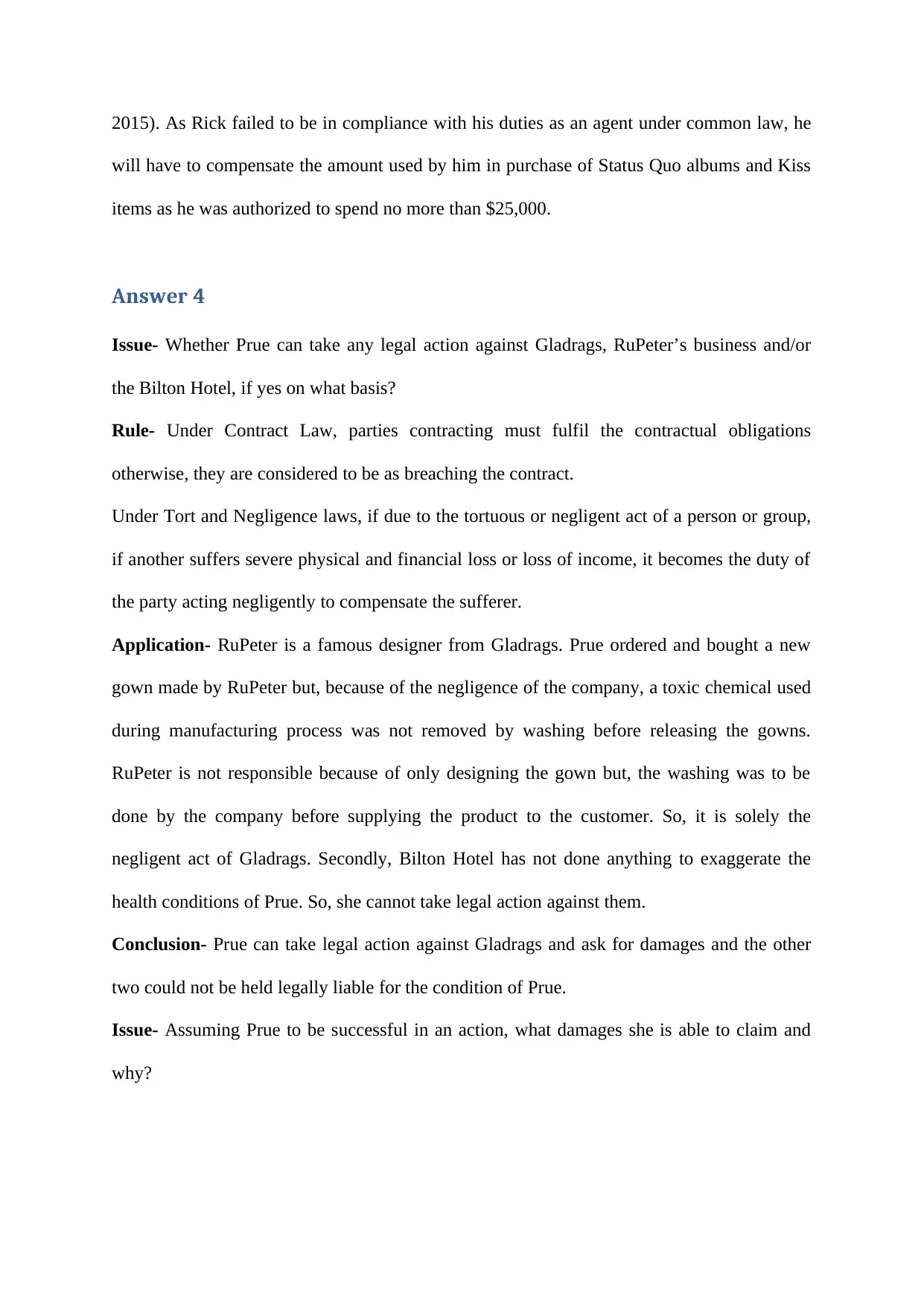
2015). As Rick failed to be in compliance with his duties as an agent under common law, he
will have to compensate the amount used by him in purchase of Status Quo albums and Kiss
items as he was authorized to spend no more than $25,000.
Answer 4
Issue- Whether Prue can take any legal action against Gladrags, RuPeter’s business and/or
the Bilton Hotel, if yes on what basis?
Rule- Under Contract Law, parties contracting must fulfil the contractual obligations
otherwise, they are considered to be as breaching the contract.
Under Tort and Negligence laws, if due to the tortuous or negligent act of a person or group,
if another suffers severe physical and financial loss or loss of income, it becomes the duty of
the party acting negligently to compensate the sufferer.
Application- RuPeter is a famous designer from Gladrags. Prue ordered and bought a new
gown made by RuPeter but, because of the negligence of the company, a toxic chemical used
during manufacturing process was not removed by washing before releasing the gowns.
RuPeter is not responsible because of only designing the gown but, the washing was to be
done by the company before supplying the product to the customer. So, it is solely the
negligent act of Gladrags. Secondly, Bilton Hotel has not done anything to exaggerate the
health conditions of Prue. So, she cannot take legal action against them.
Conclusion- Prue can take legal action against Gladrags and ask for damages and the other
two could not be held legally liable for the condition of Prue.
Issue- Assuming Prue to be successful in an action, what damages she is able to claim and
why?
will have to compensate the amount used by him in purchase of Status Quo albums and Kiss
items as he was authorized to spend no more than $25,000.
Answer 4
Issue- Whether Prue can take any legal action against Gladrags, RuPeter’s business and/or
the Bilton Hotel, if yes on what basis?
Rule- Under Contract Law, parties contracting must fulfil the contractual obligations
otherwise, they are considered to be as breaching the contract.
Under Tort and Negligence laws, if due to the tortuous or negligent act of a person or group,
if another suffers severe physical and financial loss or loss of income, it becomes the duty of
the party acting negligently to compensate the sufferer.
Application- RuPeter is a famous designer from Gladrags. Prue ordered and bought a new
gown made by RuPeter but, because of the negligence of the company, a toxic chemical used
during manufacturing process was not removed by washing before releasing the gowns.
RuPeter is not responsible because of only designing the gown but, the washing was to be
done by the company before supplying the product to the customer. So, it is solely the
negligent act of Gladrags. Secondly, Bilton Hotel has not done anything to exaggerate the
health conditions of Prue. So, she cannot take legal action against them.
Conclusion- Prue can take legal action against Gladrags and ask for damages and the other
two could not be held legally liable for the condition of Prue.
Issue- Assuming Prue to be successful in an action, what damages she is able to claim and
why?
Paraphrase This Document
Need a fresh take? Get an instant paraphrase of this document with our AI Paraphraser
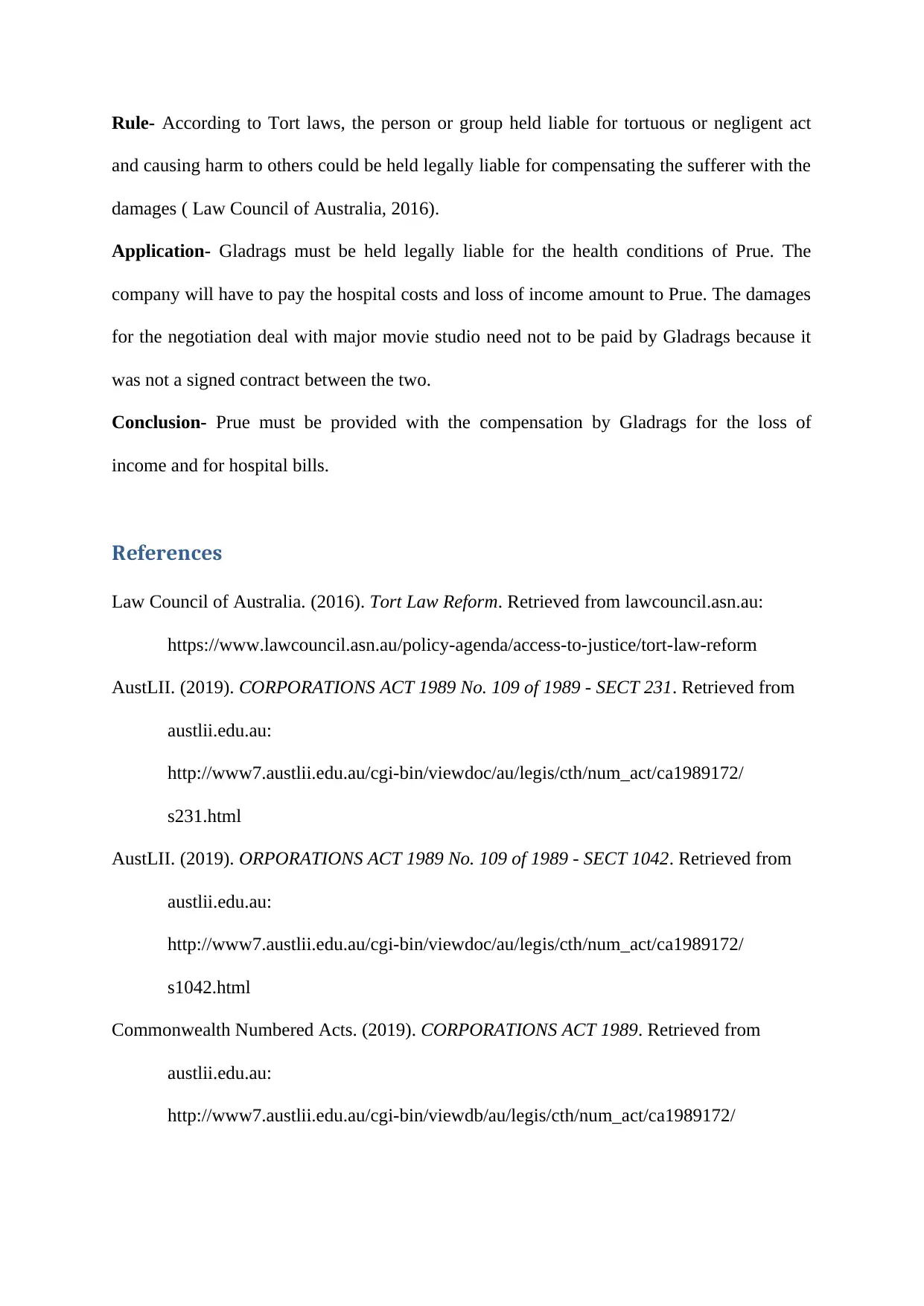
Rule- According to Tort laws, the person or group held liable for tortuous or negligent act
and causing harm to others could be held legally liable for compensating the sufferer with the
damages ( Law Council of Australia, 2016).
Application- Gladrags must be held legally liable for the health conditions of Prue. The
company will have to pay the hospital costs and loss of income amount to Prue. The damages
for the negotiation deal with major movie studio need not to be paid by Gladrags because it
was not a signed contract between the two.
Conclusion- Prue must be provided with the compensation by Gladrags for the loss of
income and for hospital bills.
References
Law Council of Australia. (2016). Tort Law Reform. Retrieved from lawcouncil.asn.au:
https://www.lawcouncil.asn.au/policy-agenda/access-to-justice/tort-law-reform
AustLII. (2019). CORPORATIONS ACT 1989 No. 109 of 1989 - SECT 231. Retrieved from
austlii.edu.au:
http://www7.austlii.edu.au/cgi-bin/viewdoc/au/legis/cth/num_act/ca1989172/
s231.html
AustLII. (2019). ORPORATIONS ACT 1989 No. 109 of 1989 - SECT 1042. Retrieved from
austlii.edu.au:
http://www7.austlii.edu.au/cgi-bin/viewdoc/au/legis/cth/num_act/ca1989172/
s1042.html
Commonwealth Numbered Acts. (2019). CORPORATIONS ACT 1989. Retrieved from
austlii.edu.au:
http://www7.austlii.edu.au/cgi-bin/viewdb/au/legis/cth/num_act/ca1989172/
and causing harm to others could be held legally liable for compensating the sufferer with the
damages ( Law Council of Australia, 2016).
Application- Gladrags must be held legally liable for the health conditions of Prue. The
company will have to pay the hospital costs and loss of income amount to Prue. The damages
for the negotiation deal with major movie studio need not to be paid by Gladrags because it
was not a signed contract between the two.
Conclusion- Prue must be provided with the compensation by Gladrags for the loss of
income and for hospital bills.
References
Law Council of Australia. (2016). Tort Law Reform. Retrieved from lawcouncil.asn.au:
https://www.lawcouncil.asn.au/policy-agenda/access-to-justice/tort-law-reform
AustLII. (2019). CORPORATIONS ACT 1989 No. 109 of 1989 - SECT 231. Retrieved from
austlii.edu.au:
http://www7.austlii.edu.au/cgi-bin/viewdoc/au/legis/cth/num_act/ca1989172/
s231.html
AustLII. (2019). ORPORATIONS ACT 1989 No. 109 of 1989 - SECT 1042. Retrieved from
austlii.edu.au:
http://www7.austlii.edu.au/cgi-bin/viewdoc/au/legis/cth/num_act/ca1989172/
s1042.html
Commonwealth Numbered Acts. (2019). CORPORATIONS ACT 1989. Retrieved from
austlii.edu.au:
http://www7.austlii.edu.au/cgi-bin/viewdb/au/legis/cth/num_act/ca1989172/
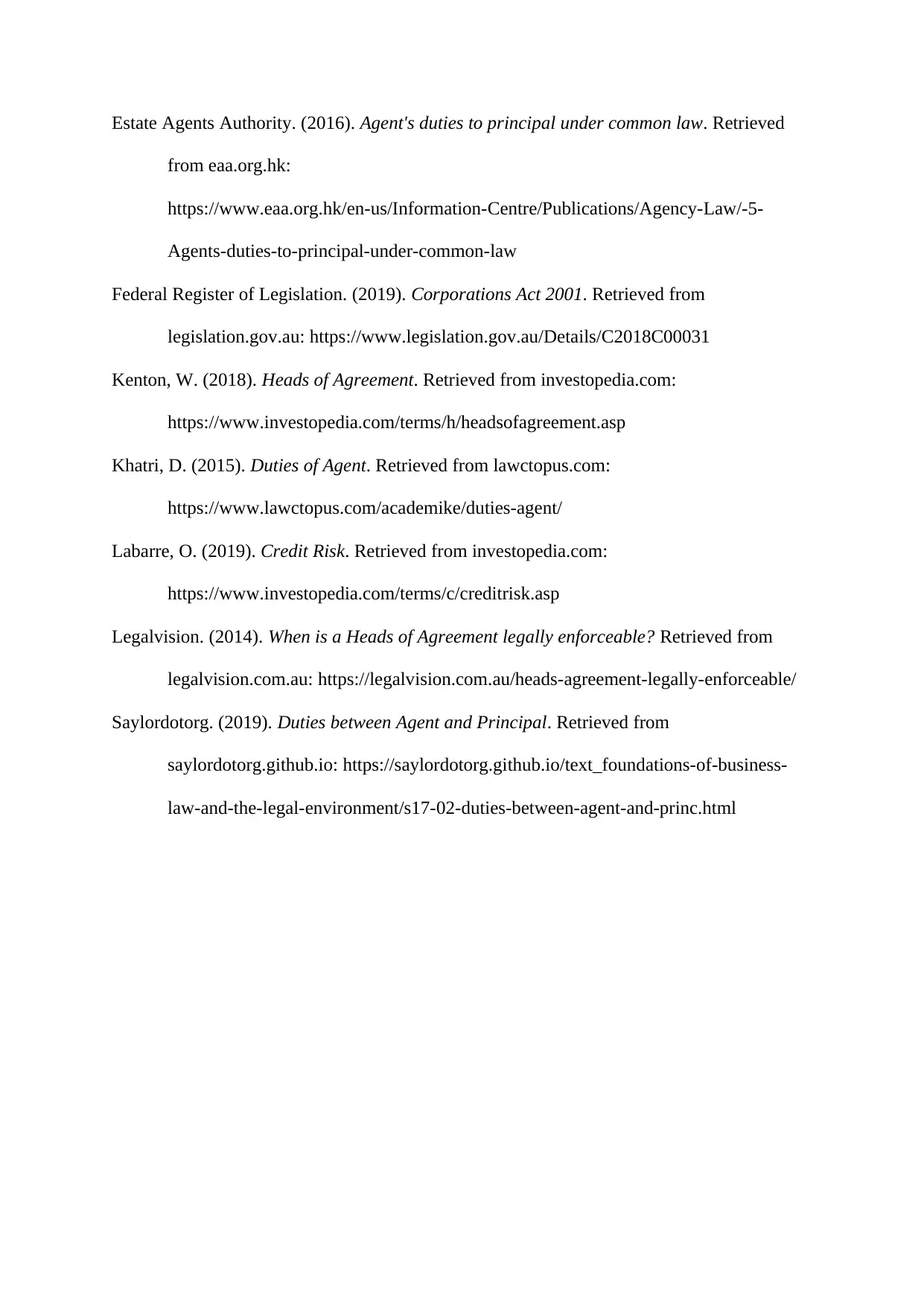
Estate Agents Authority. (2016). Agent's duties to principal under common law. Retrieved
from eaa.org.hk:
https://www.eaa.org.hk/en-us/Information-Centre/Publications/Agency-Law/-5-
Agents-duties-to-principal-under-common-law
Federal Register of Legislation. (2019). Corporations Act 2001. Retrieved from
legislation.gov.au: https://www.legislation.gov.au/Details/C2018C00031
Kenton, W. (2018). Heads of Agreement. Retrieved from investopedia.com:
https://www.investopedia.com/terms/h/headsofagreement.asp
Khatri, D. (2015). Duties of Agent. Retrieved from lawctopus.com:
https://www.lawctopus.com/academike/duties-agent/
Labarre, O. (2019). Credit Risk. Retrieved from investopedia.com:
https://www.investopedia.com/terms/c/creditrisk.asp
Legalvision. (2014). When is a Heads of Agreement legally enforceable? Retrieved from
legalvision.com.au: https://legalvision.com.au/heads-agreement-legally-enforceable/
Saylordotorg. (2019). Duties between Agent and Principal. Retrieved from
saylordotorg.github.io: https://saylordotorg.github.io/text_foundations-of-business-
law-and-the-legal-environment/s17-02-duties-between-agent-and-princ.html
from eaa.org.hk:
https://www.eaa.org.hk/en-us/Information-Centre/Publications/Agency-Law/-5-
Agents-duties-to-principal-under-common-law
Federal Register of Legislation. (2019). Corporations Act 2001. Retrieved from
legislation.gov.au: https://www.legislation.gov.au/Details/C2018C00031
Kenton, W. (2018). Heads of Agreement. Retrieved from investopedia.com:
https://www.investopedia.com/terms/h/headsofagreement.asp
Khatri, D. (2015). Duties of Agent. Retrieved from lawctopus.com:
https://www.lawctopus.com/academike/duties-agent/
Labarre, O. (2019). Credit Risk. Retrieved from investopedia.com:
https://www.investopedia.com/terms/c/creditrisk.asp
Legalvision. (2014). When is a Heads of Agreement legally enforceable? Retrieved from
legalvision.com.au: https://legalvision.com.au/heads-agreement-legally-enforceable/
Saylordotorg. (2019). Duties between Agent and Principal. Retrieved from
saylordotorg.github.io: https://saylordotorg.github.io/text_foundations-of-business-
law-and-the-legal-environment/s17-02-duties-between-agent-and-princ.html
⊘ This is a preview!⊘
Do you want full access?
Subscribe today to unlock all pages.

Trusted by 1+ million students worldwide
1 out of 9
Related Documents
Your All-in-One AI-Powered Toolkit for Academic Success.
+13062052269
info@desklib.com
Available 24*7 on WhatsApp / Email
![[object Object]](/_next/static/media/star-bottom.7253800d.svg)
Unlock your academic potential
Copyright © 2020–2026 A2Z Services. All Rights Reserved. Developed and managed by ZUCOL.





